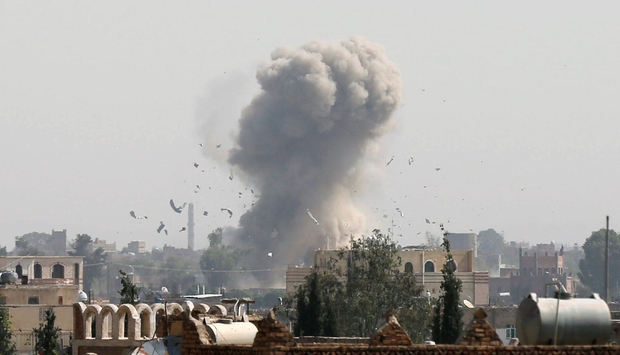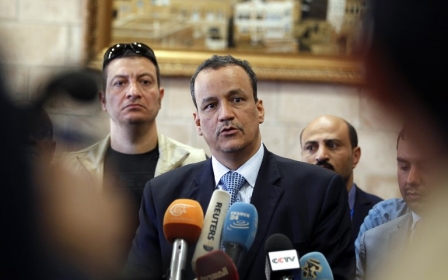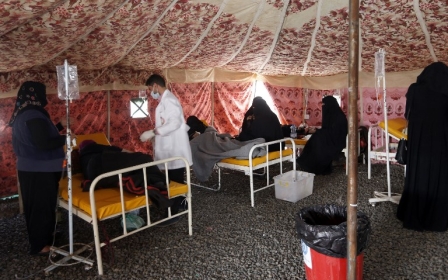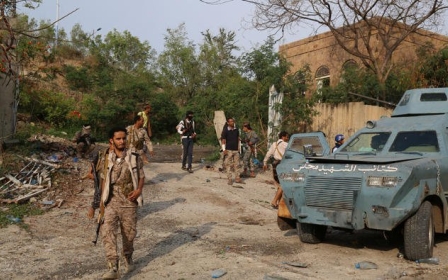US-Saudi arms deal heads towards $500m Senate showdown

The US Senate is headed for a showdown with President Donald Trump over the proposed sale of precision-guided munitions to Saudi Arabia.
Perhaps as early as 8 June, the Senate will vote on a resolution that seeks to block the sale of $500m in precision-guided bombs that the administration wants to sell to the Saudi air force, which is currently engaged in a vicious war in Yemen that has killed thousands of civilians.
The impending vote will indicate how much congressional opposition to Saudi Arabia’s conduct in Yemen has grown in recent months, and whether the Saudis may have lost some clout in Washington.
“Thousands of civilians have been unjustly killed or wounded by Saudi-led forces in the Yemeni civil war,” Senator Al Franken, one of the lawmakers who introduced the weapons-blocking bill, said in a statement.
“But despite this tragedy, the US continues to sell billions of dollars of weaponry to the Saudis while turning a blind eye to their indiscriminate killing of children, women, and men in Yemen. Our bipartisan resolution would block the latest weapon sale and help demonstrate that the US won’t stand for what the Saudis are doing to innocent people.”
Under the Arms Export Control Act, which was codified into law in 1976, any senator has the power to force a vote on an arms deal, which guarantees that the munitions sale will come up on the Senate floor.
It will be the first vote on a Saudi arms sale since September 2016, when a bill to block the sale of tanks to the Saudi military failed by a vote of 71-27.
'Almost impossible'
Advocates for blocking the weapons sale say there’s a good chance they will see congressional opposition increase, compared with last year’s vote, though it will probably fall short of halting the deal.
It’s “almost an impossible goal to block these sales in Congress,” said Will Picard, executive director of the Yemen Peace Project, which opposes the arms sale.
To halt a deal, the Senate and House would have to pass a bill with enough support to withstand a veto by President Trump. Sceptics of the sale also have to contend with arms industry lobbying and a general sense in Washington that it's important to back the Saudis in its proxy war with Iran.
The Saudis have long asserted that its war in Yemen against the Houthi rebel group is about rolling back Iranian influence in the region, though many experts say the extent of Iran’s influence over the Houthis is exaggerated.
Still, Picard told Middle East Eye “there’s a lot of scepticism in Congress” about the Saudi war on Yemen. He added that “members of Congress are really serious about doing something, and trying multiple approaches to get the administration to come to Congress and explain what US interests are, why the US is supporting the Saudi-led coalition and whether the Saudi coalition is doing anything to reduce harm to civilians”.
Advocates for blocking the arms deal got a boost on 7 June, when Senator Ben Cardin, the top Democrat on the Senate Foreign Relations Committee, announced his objections to the sale. Still, Republican Senator Bob Corker told reporters that he thinks most senators will support the precision-guided munitions sale.
Opposition to the delivery of American bombs to the Saudi air force is being fuelled by concerns over the deaths of Yemeni civilians and the bombing of Yemeni civilian infrastructure.
The Saudis have been waging war against the Houthi rebel group since they overthrew Yemen’s government in 2015. Human rights groups have repeatedly accused Saudi’s military campaign in Yemen - which operates with the support of the US military - of war crimes.
Introduced on 25 May by Republican Senator Rand Paul and Democratic Senators Chris Murphy and Al Franken, the legislation would halt the sale of $500m in precision-guided munitions - a sale that was previously blocked by the Obama administration after the Saudis bombed a funeral hall and killed 100 people, mostly civilians.
Trump gung ho
This $500m package is part of Trump’s overall push to sell $110bn in arms to the Saudis, which was announced to much fanfare during the president’s trip to the kingdom in May. The mammoth weapons proposal showed that Trump intends to bring the US closer to the royal kingdom.
William Hartung, director of the Arms and Security Project at the Center for International Policy, told Middle East Eye that the massive weapons announcement in Saudi Arabia was about Trump wanting to put up “the biggest number possible [to show] that ‘we’re in your corner - that we don’t like the Iran nuclear deal, we’ll never be in Iran’s corner, and we won’t push back on Yemen.’”
Hartung added that Trump is “enthusiastic in his support for the Saudis. And that might be dangerous in terms of them trying to win the war, or at least to keep pounding away until they're in a more favourable position”.
For Yemeni civilians, that likely means more war with no end in sight and more civilian deaths, coupled with a deepening humanitarian crisis, including a mass cholera outbreak.
Meanwhile, as the political debate on arms for Saudi Arabia continues to heat up, legal experts have warned that the proposed deal may be illegal under US law.
Last month, the American Bar Association’s Center for Human Rights sent along an opinion authored by law professor Michael Newton that outlined why the arms sale may violate federal law. Newton argued that multiple UN investigations and human rights reports have found that the Saudis engaged in war crimes by indiscriminately bombing civilians.
Under the Foreign Assistance Act, the US cannot sell arms to countries that consistently violate human rights. And under the Arms Export Control Act, the US can only sell weapons to countries that use them for “legitimate self-defence”.
“Given the prima facie evidence of wrongdoing by Saudi Arabia, continued sale of arms to Saudi Arabia - and specifically of arms used in air strikes - should not be presumed to be permissible,” Newton wrote.
“Direct commercial sales should not resume until Saudi Arabia has ceased violating international humanitarian law, and provides evidence of such targeting compliance.”
New MEE newsletter: Jerusalem Dispatch
Sign up to get the latest insights and analysis on Israel-Palestine, alongside Turkey Unpacked and other MEE newsletters
Middle East Eye delivers independent and unrivalled coverage and analysis of the Middle East, North Africa and beyond. To learn more about republishing this content and the associated fees, please fill out this form. More about MEE can be found here.




